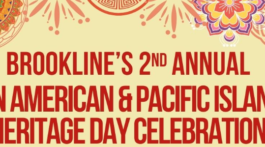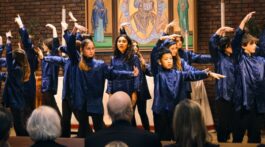Photo Credit: Brookline Public Library and Brookline Historical Society.
Ahead of Martin Luther King Jr. Day, Brookline will confront a relatively unexamined part of its recent past: to what extent was the wealthy Boston suburb — indeed the birthplace of President John F. Kennedy — racist.
On Monday, a short documentary entitled “Brookline, Facing Civil Rights” will be aired to the public at the Coolidge Corner Theatre. The short film melds first-person testimony from prominent black community members, as well as an account from former Massachusetts Governor Michael Dukakis, to paint a complete picture of Brookline — often touted as a bastion of liberal values — during the civil rights era.
Brookline’s MLK Celebration Committee commissioned filmmaker Harvey Bravman, publisher of BrooklineHub.com, to interview a group of Brookline residents who lived through the tumultuous period of the town’s history for its archives.
Bravman, who previously compiled interview footage of residents who survived the Holocaust, took on the task, sitting down with the seven high-powered witnesses to the often-untold underbelly of racism, antisemitism and discrimination rampant in the all-white Brookline throughout the 1950s and 1960s.
It resulted in five hours of video interview footage, which Bravman compressed into a 22-minute documentary short that threads the testimonies of their lived experiences into a compelling narrative, accompanied by photos from that period. Bravman teamed up with his longtime editor and friend, Robert Kirwan, on the project. Kirwan also served as editor for Bravman on “Soul Witness, The Brookline Holocaust Witness Project”.
“Brookline, Facing Civil Rights” consists of interviews, including
- Ruth Ellen Fitch – Brookline’s first METCO Director, and the first black female to become a partner in a Boston law firm;
- Bobbie Knable – dean of students at Tufts University from 1980 to 2000;
- Ed and Diana McClure (Ed was a mediator for the U.S. Department of Justice during the Boston Bussing Crises);
- Julia Wilson, wife of the renowned artist, John Wilson;
- Mark Gray, general counsel for the Massachusetts Executive Office of Elder Affairs in Dukakis’ administration;
- Gov. Michael Dukakis, who was also a “housing tester” in Brookline.
Testimony from the film takes aim at, among other things, Brookline’s discriminatory housing practices, which Dukakis investigated at the time.
“Brookline, like the country, was racist,” Dukakis said in the film, “People of color had virtually nothing in this town. They didn’t live here; they weren’t welcomed. I mean this town was just shut off to people of color.”
As he did with his film on Brookline’s Holocaust survivors, “Soul Witness, The Brookline Holocaust Witness Project,” Bravman put his own resources into the MLK Day project but said that a grant from the Town of Brookline, with the help of the Brookline Community Foundation, made it a reality.
The film will be shown as part of Brookline’s MLK Celebration at the Coolidge Corner Theatre beginning at 3 p.m., January 21. The film viewing is following a discussion between Brookline Select Board member Bernard Green, who is the first black official elected to the board, and Boston Globe Spotlight Team Editor Patricia Wen, whose first major project included overseeing the Globe’s wide-reaching seven-part series on issues of race in contemporary Boston.
Wen said Bravman’s film was very “powerful … intimate” and “excellent.”
“It made a large, cosmic issue very local,” the Brookline resident said. “I felt like I was sitting in the living room listening to these people talk.”
Wen said she appreciated the “mixing of the national reminders of the civil rights movement” through the film’s archived photographs with local Brookline voices.
“You got the impression that there was very little filter, and that you got to hear directly from them,” she said.
The Globe’s wide-reaching seven-part series explored racial discrimination across industries spanning the healthcare sector, universities, housing, politics, and sports in Boston, concluding that while attitudes about race have improved over the years, systemic racism is still pervasive. The reporting project was a finalist for the 2018 Pulitzer Prize in local reporting.
Bravman said he hopes the film “opens people’s eyes” to a period of local history that has been neglected.
“These were people who were victimized where we live,” he said. “I think it’s important for us to listen to each other, and it helps us move the needle if we listen to people who have been in harm’s way. Just listen to their experiences; it helps us move forward, knowing what we know.”
Brookline’s MLK Day Celebration is free to the public, but advance seats must be reserved.












